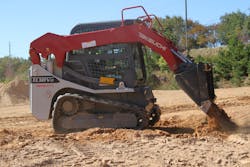Help Your Machine Beat the Heat
Wear and tear on a machine accelerates in extreme conditions, so preparation for weather is essential. With summer here, that means preparing for the heat.
Joe Topia, national training manager at Takeuchi, reminds us that a proactive approach can avoid downtime.
“First, it’s important to understand the environment you are working in and follow the operator’s manual guidelines,” he says.
“Summer is a busy time for construction, so the last thing you or your crew need is your machine breaking down due to the rising temps,” Topia says. “To ensure you have uptime instead of costly downtime, it’s best to create a proactive plan.”
As a foundation and on a regular basis, he recommends keeping machines clean, keeping service up-to-date, and correctly greasing the unit.
Topia says to always check the following before starting the machine:
- All fluids are up to the correct levels.
- Coolant is mixed correctly to your operating environment and temperature.
- The radiator is clean and free flowing.
- The fan and fan drive belt are adjusted correctly.
- Airflow passages are clean so the machine can exchange the hot air in the engine compartment with cool air from the outside (loader tower needs to be debris free). Without proper airflow the engine compartment can turn into a hot box, trapping the heat.
There’s heat, and then there’s extreme heat.
“When the temperature spikes, the components naturally work harder and can wear out quickly,” Topia says.
He offers these tips for those very, very hot days:
- Check the display on your machine to see if it is operating at optimum capacity (especially as the day goes on).
- If the machine is in stressed conditions, try to find some shade to help it cool down faster. A stressed unit can be dangerous for the operator and anyone around the machine.
- Let the machine idle before completely shutting down.
“And if your machine is equipped with telematics, it’s easy to check the engine temperature and catch any irregularities before anything too serious happens,” Topia says.
Even if you have the tendency to think you’re Superman (or Supergirl) and you can handle extreme conditions, don’t think of a machine that way.
“When working with a well-built machine, it’s not unusual to take on an indestructible mentality—that we can move that rock as big as a house, climb straight up the side of the bank, or cross the deep pond or river, but we need to understand the purpose and limitations of our equipment and take special precautions for extreme operating conditions,” Topia says.
“Remember, a machine is a like tank with a bucket; if maintained correctly by servicing and greasing regularly, it will hold up to extremely harsh conditions. A proactive effort will pay off in the long run.”
